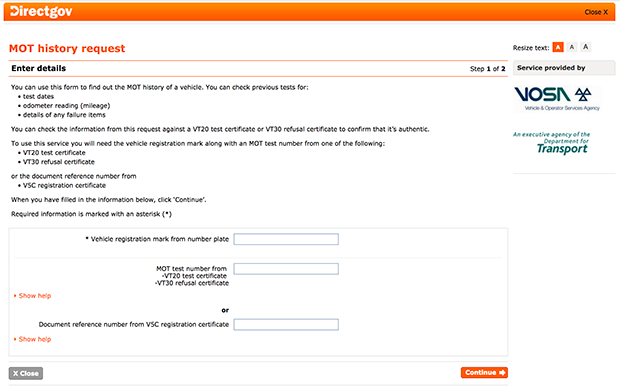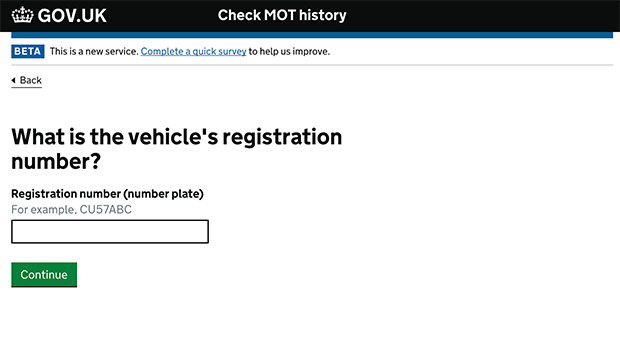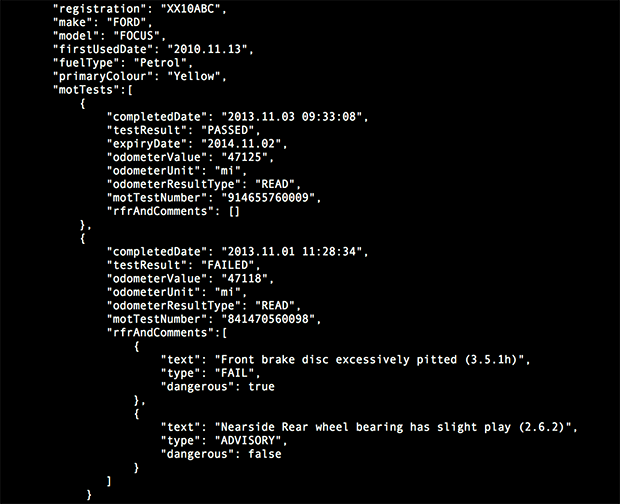This is a blog post about how the Driver and Vehicle Standards Agency (DVSA) has opened up access to its MOT history data. Use the service to check the MOT history of a vehicle if you're looking for details about a specific vehicle.
When we design services, making our underlying data open isn’t always at the top of our backlog priorities. That’s because we're designing services to make it simpler, clearer and faster for millions of users to get what they need from government.
But opening up our data is important. Insight and a lot of good user research have got us to a really good place with making our MOT data open (for readers outside the UK, the MOT is the annual check that vehicles have to make sure they meet basic vehicle safety, roadworthiness, and exhaust emissions standards).
The history of MOT history
We make most of our data available through the service to check the MOT history of a vehicle. It's one of the top 10 government services - we get around 4.5 million hits per month (we even had 18,000 on Christmas Day!).
In 2015, we completely rebuilt this service. It wasn't just a like-for-like replacement, though.
To use the old service, the user needed the vehicle's number plate and either the latest MOT certificate number, or the vehicle's log book (V5C) number.

The old service collected feedback from users. A lot of it was along the lines of ‘If I knew my certificate number I wouldn’t need to check this service’ and ‘I'm thinking of buying this car, but I don’t know these things.’.
In fact, a lot of the feedback was pretty passionate (and colourful) about how far this old service was from meeting user needs! But in our old way of working, it wasn't a fast process to be able to act on this feedback.
Make things open, it makes things better
This led us to think about the service in a new way – about how we could make it as open as possible.
To meet the needs of users who didn’t have all the documents, or who were thinking of buying a car, we needed to get rid of the barriers that were in the old service.
That meant questioning how limited access to some of this data needed to be.
So that’s what we did. The result was a service where you can check the MOT history of a vehicle with just the number plate, and you have access to nearly all of the data the old service had.

Meeting the needs of businesses
From our research, we knew most users were individuals – people forgetting when their MOT was due, people thinking of buying a car, or people selling cars. But we also found that some big companies who sold cars also used our data.
This made sense. MOT data can tell you a lot about how well a car has been looked after. It forms part of the history of a vehicle, which responsible sellers will share with prospective buyers.
There was clearly a need to make it easier to access large amounts of MOT data without having to go into the service hundreds or thousands of times, typing in number plates.
So, we created an application programming interface (API). This is a way for one computer to use information or services held on another computer, often across the internet.
The MOT history API gives authorised third-party organisations a way to access MOT test history information for vehicles, including:
- MOT test date
- MOT expiry date
- test result
- mileage reading
- MOT test number
- reasons for failure and advisory notices
- first MOT due date for new vehicles

How the API is being used so far
Making the API available drew out further prospective users of our data who hadn't appeared when we did our initial user research. That's because they hadn’t necessarily thought that accessing the data in this way could be possible.
As we've progressed, we've better understood new users’ needs, which has allowed us to improve access for them.
When creating the API, we agreed we'd only refuse access to it if we felt the use of the data could be criminal. We haven’t yet had to refuse.
In fact, we’ve found quite the opposite. All of the uses we know about of our data are firmly achieving public good - which might be improving road safety or protecting consumers.
Here’s a flavour of some of the uses of our data:
- providing car details for prospective car buyers at auctions
- car insurance companies using our data as an indicator of how well cars are being looked after (and hence influencing the price of insurance)
- validating car mileages for cars offered for sale
- tracing potential mileage fraud
- building apps to remind motorists when their MOT is due and the reasons why that type of vehicle will most likely fail
- providing compliance data for companies with large vehicle fleets
Public data for the public good
We often get asked whether we could (or should) charge for access to this data. After all, it does help companies make more money.
As I’ve said, all the uses we've seen have been for the public good. So, if we did charge, not all of them would use the data, not all the experiments with it would happen, and we wouldn’t see the public good.
Our mantra is that this is public data – the public paid for their MOTs. Our job is to maximise the road safety and other benefits we can from that MOT. And, of course, providing our data in this way isn't costly.
We're still being sensible
In all of this, it’s easy to sound reckless. We shouldn’t be that way with data, which may have its sensitivities. Because we strive to be so open with our data, we're rigorous and systematic in how we understand the risks of making information available.
We try to understand how our data could be misused so we can make sensible decisions about what to make available. But we don’t just take what has gone before as set in stone. We challenge assumptions and the way things have been done.
It's meant we’ve made data far more accessible than it’s historically been.
And where risks have crept out of the woodwork that we hadn’t foreseen, we’ve been in a position where we could deal with it quickly. But we know that if you understand the data and the possible uses, both good and bad, this shouldn’t be a problem.
Next steps
We’re still very much on a journey with this. We're keen to:
- add lorry and bus test data to the service (the current MOT data only includes cars, vans, motorcycles and minibuses - all 30 million of them)
- work with colleagues in Northern Ireland to extend the service there (it currently covers MOTs done in England, Scotland and Wales)
We’ve also started looking at how we can add data from other organisations to ours to make it more useful.
In December 2017, we added data from the Society of Motor Manufacturers and Traders (SMMT) on whether individual cars have an outstanding manufacturer safety recall.
Longer term, we'll work with DVLA and other government agencies to further improve data openness. By merging multiple data sources into one service, motorists can easily find all the data the government hold on their vehicle, be it MOT, tax or recall information.
And, of course, there'll be some next steps we don’t yet know about! If we’ve learnt nothing else, it's that once you start making data more helpfully available, more users and user needs appear. It will be those that direct the next steps.
Keep up to date with our work by signing up for email alerts or following DVSA digital on Twitter.
4 comments
Comment by Matthew posted on
I see the DVSA has allowed MOT reminders via text. Do you know if the ability to enable/disable this will be available over an API for software?
Comment by Richard Preston posted on
Have you made any progress with Northern Irish MOTs?
Comment by Andrew posted on
It would be great if this approach could be extended to provide access to the Vehicle Enquiry service. Please.
https://vehicleenquiry.service.gov.uk
At the moment there's a cost to access that data in bulk (£96k per year?) which prevents some public good use of the data - e.g. local authorities understanding the emissions profile of vehicles in their area and modelling potential impacts of low emission zones.
https://data.gov.uk/dataset/dvla-vehicles-database
A similarly free to access vehicle enquiry API would open up those use cases.
Comment by Charles Sweeney posted on
Good article. I'm one of the new users of your API. I use it on regisearch.co.uk to show MOT history along with vehicle information and tax prices.
Very pleased with it, nice and simple. I would welcome all and any additional information you could provide. I notice on the Government MOT History service site, you now show the test stations where the MOTs were carried out. This isn't available through the API, would be great if it was! Again, getting as much information out there as possible.
Agree too, it should be provided for free. I don't make any money from my site, I'm not one of the big businesses you talk about! You correctly say that people pay for it through their MOT tests, and not wishing to get political, but we also pay for it through our taxes!
Keep up the good work!